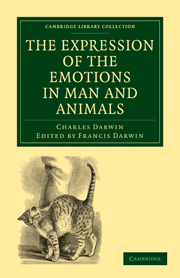Book contents
- Frontmatter
- PREFACE TO THE SECOND EDITION
- Contents
- LIST OF ILLUSTRATIONS
- INTRODUCTION
- CHAP. I GENERAL PRINCIPLES OF EXPRESSION
- CHAP. II GENERAL PRINCIPLES OF EXPRESSION—continued
- CHAP. III GENERAL PRINCIPLES OF EXPRESSION—concluded
- CHAP. IV MEANS OF EXPRESSION IN ANIMALS
- CHAP. V SPECIAL EXPRESSIONS OF ANIMALS
- CHAP. VI SPECIAL EXPRESSIONS OF MAN: SUFFERING AND WEEPING
- CHAP. VII LOW SPIRITS, ANXIETY, GRIEF, DEJECTION, DESPAIR
- CHAP. VIII JOY, HIGH SPIRITS, LOVE, TENDER FEELINGS, DEVOTION
- CHAP. IX REFLECTION—MEDITATION—ILL-TEMPER—SULKINESS—DETERMINATION
- CHAP. X HATRED AND ANGER
- CHAP. XI DISDAIN — CONTEMPT — DISGUST — GUILT — PRIDE, ETC. — HELPLESSNESS — PATIENCE — AFFIRMATION AND NEGATION
- CHAP. XII SURPRISE—ASTONISHMENT—FEAR—HORROR
- CHAP. XIII SELF-ATTENTION—SHAME—SHYNESS—MODESTY: BLUSHING
- CHAP. XIV CONCLUDING REMARKS AND SUMMARY
- INDEX
- Plate section
CHAP. VI - SPECIAL EXPRESSIONS OF MAN: SUFFERING AND WEEPING
Published online by Cambridge University Press: 07 September 2010
- Frontmatter
- PREFACE TO THE SECOND EDITION
- Contents
- LIST OF ILLUSTRATIONS
- INTRODUCTION
- CHAP. I GENERAL PRINCIPLES OF EXPRESSION
- CHAP. II GENERAL PRINCIPLES OF EXPRESSION—continued
- CHAP. III GENERAL PRINCIPLES OF EXPRESSION—concluded
- CHAP. IV MEANS OF EXPRESSION IN ANIMALS
- CHAP. V SPECIAL EXPRESSIONS OF ANIMALS
- CHAP. VI SPECIAL EXPRESSIONS OF MAN: SUFFERING AND WEEPING
- CHAP. VII LOW SPIRITS, ANXIETY, GRIEF, DEJECTION, DESPAIR
- CHAP. VIII JOY, HIGH SPIRITS, LOVE, TENDER FEELINGS, DEVOTION
- CHAP. IX REFLECTION—MEDITATION—ILL-TEMPER—SULKINESS—DETERMINATION
- CHAP. X HATRED AND ANGER
- CHAP. XI DISDAIN — CONTEMPT — DISGUST — GUILT — PRIDE, ETC. — HELPLESSNESS — PATIENCE — AFFIRMATION AND NEGATION
- CHAP. XII SURPRISE—ASTONISHMENT—FEAR—HORROR
- CHAP. XIII SELF-ATTENTION—SHAME—SHYNESS—MODESTY: BLUSHING
- CHAP. XIV CONCLUDING REMARKS AND SUMMARY
- INDEX
- Plate section
Summary
In this and the following chapters the expressions exhibited by Man under various states of the mind will be described and explained, as far as lies in my power. My observations will be arranged according to the order which I have found the most convenient; and this will generally lead to opposite emotions and sensations succeeding each other.
Suffering of the body and mind: weeping.—I have already described in sufficient detail, in the third chapter, the signs of extreme pain, as shown by screams or groans, with the writhing of the whole body and the teeth clenched or ground together. These signs are often accompanied or followed by profuse sweating, pallor, trembling, utter prostration, or faintness. No suffering is greater than that from extreme fear or horror, but here a distinct emotion comes into play, and will be elsewhere considered. Prolonged suffering, especially of the mind, passes into low spirits, grief, dejection, and despair, and these states will be the subject of the following chapter. Here I shall almost confine myself to weeping or crying, more especially in children.
Infants, when suffering even slight pain, moderate hunger, or discomfort, utter violent and prolonged screams. Whilst thus screaming their eyes are firmly closed, so that the skin round them is wrinkled, and the forehead contracted into a frown. The mouth is widely opened with the lips retracted in a peculiar manner, which causes it to assume a squarish form: the gums or teeth being more or less exposed.
Information
- Type
- Chapter
- Information
- The Expression of the Emotions in Man and Animals , pp. 154 - 185Publisher: Cambridge University PressPrint publication year: 2009First published in: 1890
Accessibility standard: Unknown
Why this information is here
This section outlines the accessibility features of this content - including support for screen readers, full keyboard navigation and high-contrast display options. This may not be relevant for you.Accessibility Information
- 1
- Cited by
